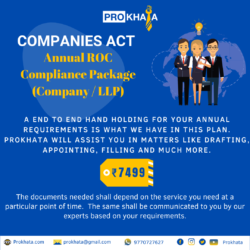 One Person Company (OPC) Registration Services at Prokhata
One Person Company (OPC) Registration Services at Prokhata 
 Services Covered
Services Covered
Filing of E-forms
Name approval
DSC Class -3 (1 No.)
Filing of SPICe form
Issue of Incorporation Certificate
Includes Govt Fees & Stamp duty for Authorized Capital up to ₹1 Lakh
Excludes foreign national / Body Corporate as director or business needing RBI/SEBI approval
 Who Should Buy
Who Should Buy
Entrepreneurs who wish to form a company with limited liability
Proprietorship firms looking to get the status of a company
 How It’s Done
How It’s Done
Purchase of Plan
DSC Application
Company Name Reservation with RUN
Filing of e-Forms with ROC
Receipt of Incorporation Certificate
Estimated Time: 20 days
 Documents to be Submitted
Documents to be Submitted
Passport size photos of directors
Address proof of directors
Photo ID proof of directors
Specimen signature
Self-declaration about your directorship in other companies
Rent agreement of your registered office
No objection certificate from the owner of the property (if applicable)
 Frequently Asked Questions (FAQs)
Frequently Asked Questions (FAQs)
 What is a One Person Company (OPC) and how is it different from an ordinary private limited company?
What is a One Person Company (OPC) and how is it different from an ordinary private limited company?
A One Person Company (OPC) is a new type of business entity that allows a single entrepreneur to register their business as a company with limited liability protection. Unlike a private limited company, which requires a minimum of two directors and shareholders, an OPC can be owned and managed by one person.
 What is the minimum capital requirement to start an OPC?
What is the minimum capital requirement to start an OPC?
An OPC can be started with a minimum authorized capital of ₹1 lakh. There is no mandatory requirement for paid-up capital, allowing you to start with as little as ₹2. However, if the paid-up capital exceeds ₹50 lakh or if the average turnover for three consecutive years exceeds ₹2 crore, the OPC must convert to a private limited company.
 Is there any tax advantage on forming an OPC?
Is there any tax advantage on forming an OPC?
1. Limited Liability Benefit
- The primary benefit of an OPC is limited liability, meaning the sole shareholder is not personally liable beyond their investment in the company. This isn’t a tax benefit but is important for protecting personal assets.
2. Corporate Tax Rate
- OPCs are taxed like private limited companies in India. They currently attract a corporate tax rate of 25% (for turnover up to INR 400 crore) or 30% for higher turnover. This rate can be lower than individual tax rates, especially for high-income individuals, potentially providing tax savings.
3. Dividend Distribution Tax (DDT) Removal
- The abolition of Dividend Distribution Tax (DDT) in 2020 benefits OPCs as dividends are now taxed in the hands of shareholders rather than the company. However, dividends received by the shareholder are added to personal income and taxed at the applicable individual slab rate.
4. No Tax Deduction on Remuneration for Owner
- In OPCs, the single owner can’t claim their salary as a business expense, which limits tax savings as this increases the taxable income of the company. Private limited companies with multiple shareholders can use salaries to reduce taxable profit.
5. Lower Compliance Burden for Small OPCs
- Though not a tax benefit, OPCs are subject to fewer compliance requirements than private limited companies, which can reduce overall operational costs.
6. Carry Forward of Losses and Deductions
- Like other companies, OPCs can carry forward business losses for up to 8 years, offsetting future profits and thus reducing future tax liability.
Limitations
- OPCs don’t receive any specific tax exemptions or incentives that apply exclusively to this entity type.
- Additionally, once an OPC’s turnover crosses ₹2 crore, it’s required to convert into a private limited company, which may change its tax implications.

1. Annual General Meeting (AGM)
- OPCs do not need to conduct an AGM as they have only one member. However, the company’s resolutions need to be recorded in the minutes within 30 days of the resolution’s approval by the director or sole member.
2. Board Meetings
- An OPC must conduct at least one board meeting every six months with a minimum gap of 90 days between the two meetings.
3. Filing of Financial Statements (AOC-4)
- OPCs are required to file their financial statements with the Registrar of Companies (RoC) through Form AOC-4. This includes the company’s balance sheet, profit and loss account, and the director’s report. The due date is within 180 days from the end of the financial year.
4. Annual Return (MGT-7A)
- OPCs need to file an annual return in Form MGT-7A with the RoC, providing details about the management of the OPC, shareholding structure, and other statutory details. This must be filed within 60 days from the end of the financial year (typically by 29th May).
5. Income Tax Returns (ITR-6)
- Like all companies, an OPC must file its annual income tax return in Form ITR-6. The deadline is 31st October of each assessment year. An OPC may also need to file quarterly TDS returns if it deducts tax at source for payments.
6. Statutory Audit of Financial Statements
- An OPC’s financial statements must be audited by a Chartered Accountant. This includes appointing an auditor within 30 days of incorporation, who will conduct an annual statutory audit of the financials.
7. Director’s Report
- The Director’s Report is a part of the annual filing and must include information on the financial position, changes in equity, and other disclosures as required by the Companies Act. This is typically filed with Form AOC-4 along with the financial statements.
8. GST Returns (if applicable)
- If an OPC is registered under GST, it must file monthly or quarterly GST returns (GSTR-1 and GSTR-3B) and an annual GST return (GSTR-9), depending on the turnover and registration type.
9. Event-based Compliances
- Changes in registered office address, director, or nominee: Any such changes must be updated with the RoC by filing appropriate forms like DIR-12, MGT-14, etc.
- Issue or transfer of shares: Though an OPC typically has only one shareholder, if there’s a need for transfer (such as in case of nominee succession), the OPC must comply with the transfer procedure.
10. Conversion of OPC
- If the paid-up share capital of an OPC exceeds ₹50 lakhs or its annual turnover exceeds ₹2 crore for three consecutive years, it must be converted into a private limited company or public limited company. This involves filing Form INC-6.
Penalties for Non-Compliance
- Failure to comply with these requirements can result in fines, penalties, and additional fees imposed by the Ministry of Corporate Affairs (MCA), and in extreme cases, directors may face disqualification.

A natural person who is a resident in India and an Indian citizen living in India for at least **182 days** during the preceding financial year is eligible to act as a member and nominee of an OPC. A person can only be a member of one OPC.

The Ministry of Corporate Affairs (MCA) has made the new OPC registration a completely online process. All document flow happens electronically, so there is no need for physical presence.

Yes, stamp duty charges are imposed by the state where the registered office will be located. These charges are applicable on MOA, AOA & form INC-32. The plan covers these charges for all states except Punjab & Madhya Pradesh. Additional charges may apply in these states.
 What is the government fee applicable for OPC incorporation?
What is the government fee applicable for OPC incorporation?Below are the charges applicable for DIN and other government forms:
– DIN (1 No): ₹500
– RUN Form: ₹1000
– AoA (up to ₹10 lakh authorized capital): ₹1000
– MoA: ₹1000

The stamp duty payable depends on the state you incorporate in and your authorized share capital up to ₹10 lakh. For example, in Karnataka:
– AoA: ₹1000
– MoA: ₹1000
– Form INC-32 (Form-32): ₹20
Additionally, notary charges of ₹340 will apply for two director affidavits and related stamp duty.

To bring in an additional director, you need to secure two digital signatures (DSC). If the individual resides outside India at the time of application, they must obtain PAN, Aadhaar, and current address attested by the Indian embassy in their country. Any incidental charges are not covered in this package.

You will need to have exactly matching details on all your documents to incorporate your company successfully.

Due to high demand among entrepreneurs wishing to incorporate their companies, the MCA has implemented stringent rules for name approval and issuing certificates. Consequently, processing times may vary between **20-25 working days** for completion and receipt of the certificate.
 Get Started Today!
Get Started Today!
Don’t let the complexities of company registration hold you back. Join countless satisfied customers who have streamlined their business setup processes with Prokhata.
Contact Us Now!
Visit Prokhata.com or call us at +91-8319130080 to start your One Person Company registration today! Let us help you take the first step towards establishing your business.




